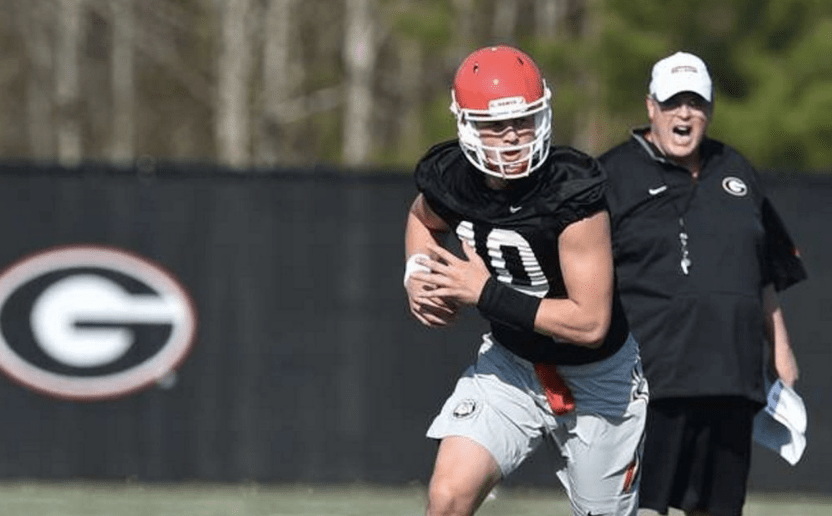
SEC East assistant coaches under most pressure in 2016
Every college football coaching job is stressful, no matter what level.
Coaching in the SEC, however, is a different animal. The fans are more passionate, the boosters are more demanding and everyone associated with the program in any way fancies themselves an expert.
The salaries are high, and so are the expectations. Here are five SEC East assistant coaches are under the most pressure in 2016:
5. Jim Chaney, OC Georgia
Chaney came to Athens from Pittsburgh to serve as Kirby Smart’s offensive coordinator. It’s an important hire for a couple of reasons, the most important being that Smart is a defensive specialist, not an offensive one.
Chaney’s task will be to improve an unit that ranked in the bottom half of the league in yards and scoring last fall — primarily by addressing the quarterback position. He will help choose the starter from Greyson Lambert, Brice Ramsey and the highly touted freshman Jacob Eason, and then develop him.
#UGAFootball CAPTION CONTEST: What is #Georgia OC Jim Chaney yelling to Jacob Eason in this picture? pic.twitter.com/EbPknydiSU
— 960 The Ref (@960theref) March 16, 2016
He has three returning starters on the offensive line and a pair of supremely talented running backs to make his job easier, but if the Bulldogs aren’t contending for a SEC East crown this fall, Chaney figures to shoulder much of the blame.
4. Kurt Roper, OC South Carolina
Like Chaney, Roper is the new offensive coordinator for a newly minted defensive-minded head coach. And like his colleague from Georgia, Roper is dealing with a contested race for the starting quarterback job.
Where Roper’s task differs from Chaney’s is dealing with the youth in the skill positions. The front-runner for the Gamecocks’ starting spot, Brandon McIlwain, is a true freshman. And more true or redshirt freshmen either dot, or will dot, the depth chart at running back and receiver.
The Gamecocks also ranked near the bottom of the conference in yards and scoring, and lost their two leading receivers and leading rusher. Roper has a history of fielding competitive offenses, and with the defense undergoing a similar rebuild, he’ll need to accelerate the timetable on this particular job.
3. D.J. Eliot, DC KENTUCKY
Eliot arrived in Lexington with Mark Stoops in 2012, and he coached defensive ends under Stoops at Florida State before his current job as Wildcats’ defensive coordinator.
The numbers suggest that 2016 is a make-or-break year for Eliot. Kentucky has finished 13th, 13th and 12th in the SEC in scoring defense in his three years and 13th, 11th and 12th in yards allowed in that span.
His defense also allowed nearly 44 points per contest in the final six games of 2015 while recording a league-low 17 sacks overall.
The bright side is that he gets to coach more of his own recruits, rather than holdovers from the Joker Phillips era. There’s also some good, young talent in the secondary (particularly Chris Westry) and a few defensive linemen, especially Denzil Ware, seem poised to take a step up.
He’ll need more production from his younger players to improve his unit’s overall numbers — and his chances of sticking around past this season.
2. Andy Ludwig, OC Vanderbilt
Ludwig cut his coaching teeth at Wisconsin, where his offenses ground opponents into dust with a power running game. That didn’t quite happen in his first season in Nashville in 2015, but he’s back to try again.
In 2015, the Commodores ranked 13th in scoring and total offense, thanks in part to a league-high 25 turnovers. Ludwig and his fellow coaches snatched the redshirt off quarterback Kyle Shurmur late in the season, and he proved to be more careful with the football than his predecessor, Johnny McCrary.
Shurmur’s back for his sophomore campaign, and he’ll still have one of the SEC’s better running backs, Ralph Webb, behind him and a deeper, more physical line in front of him. The plan is to run a power-running attack with some play-action passing to an experienced receiving corps mixed in.
With a solid defense already in place, even a modest improvement on offense could mean big things for Vanderbilt this fall.
1. Josh Heupel, OC Missouri
Only one SEC offense was worse than Vanderbilt’s last year: Missouri’s.
The Tigers were not only last in the league in yards and points, but were near the bottom nationally, finishing 125th and 127th (out of 128), respectively. At one point, Missouri went more than a month without a touchdown.
Gary Pinkel’s retirement led to a number of coaching changes at Mizzou, but Heupel’s arrival as the new offensive coordinator is by far the most important.
All he has to do is mold sophomore Drew Lock into a steady option, find four new starters on the offensive line, replace two of the team’s three leading rushers and develop a few reliable receiving options.
Maybe at some point he’ll find time to install his new offense.
It’s a challenging rebuilding job, and one that’s likely to take more than one season to complete. Still, like Vanderbilt, even a slight improvement would be welcomed.
